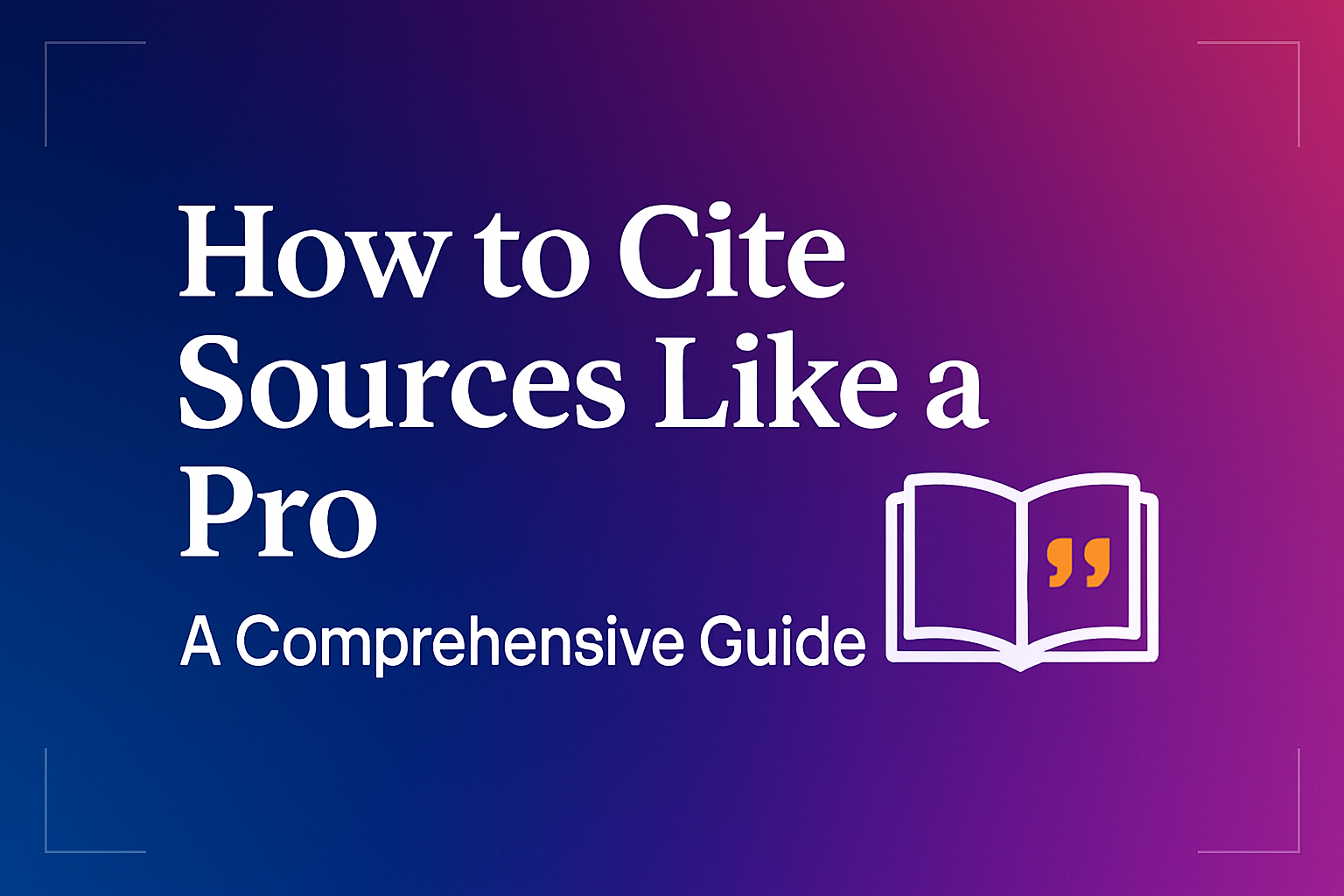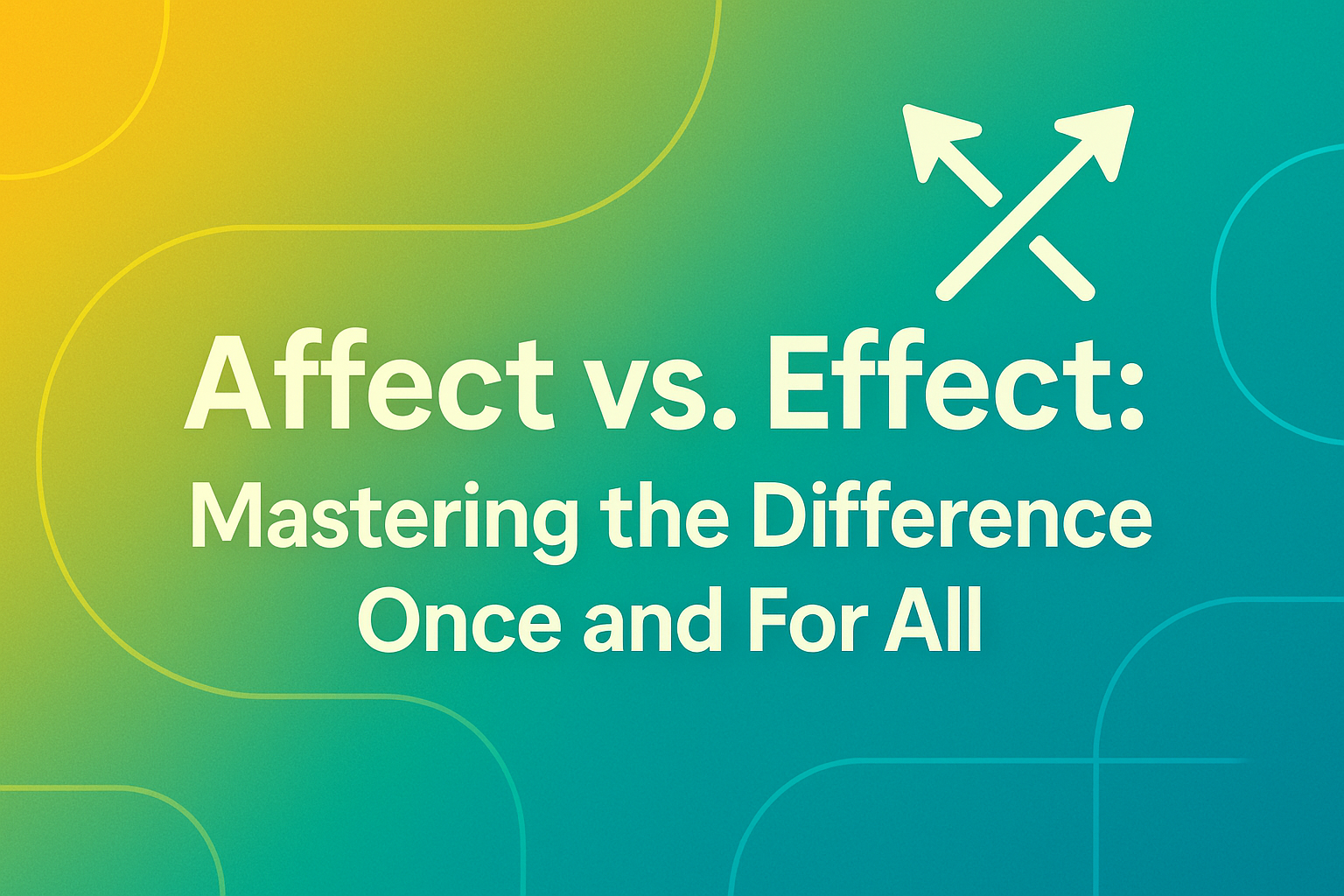
How to Cite Sources Like a Pro: A Comprehensive Guide
Master the art of citing sources with this comprehensive guide covering various citation styles, common mistakes to avoid, and best practices for academic and professional writing.
Read articleCheck your papers for plagiarism with our advanced AI tools


Few word pairs cause as much confusion as "affect" and "effect." Even experienced writers sometimes hesitate when choosing between them. The confusion is understandable—these words sound similar, have related meanings, and can sometimes function as different parts of speech. This comprehensive guide will clear up the confusion, providing you with straightforward explanations and practical strategies to use these words correctly every time.
Let's start with the most common usage pattern:
This fundamental distinction—affect as verb, effect as noun—will serve you well in about 90% of situations. If you remember nothing else from this guide, remember this core difference.
When used as a verb, "affect" means to influence, change, or have an impact on something.
In each case, something is acting upon something else and causing some kind of change. The drought influenced crop yields; the encouraging words influenced a decision; inflation influences spending habits.
Think of the "A" in "Affect" as standing for "Action." When someone or something is taking action to influence something else, you're dealing with "affect."
As a noun, "effect" refers to the result, consequence, or outcome of an action or cause.
In each example, "effect" represents the result or consequence of something: the medication resulted in relief; the tax cut resulted in minimal economic changes; exercise results in mental health benefits.
Think of the "E" in "Effect" as standing for "End result." When you're referring to the outcome or consequence of an action, you're dealing with "effect."
One popular mnemonic device for remembering the difference is RAVEN:
This simple acronym captures the most common usage pattern and can be a helpful quick reference when you're uncertain.
While the affect (verb) and effect (noun) pattern covers most uses, both words can occasionally switch roles. These exceptions are less common but important to understand for mastery.
As a verb, "effect" means to bring about, to cause to happen, or to accomplish something. This usage is less common and typically more formal.
In this usage, "effect" goes beyond merely influencing (affecting) something—it actually creates or accomplishes the result. It's about bringing something into existence, not just changing something that already exists.
When "effect" is used as a verb, you can typically replace it with "bring about," "cause," or "accomplish" and the sentence will still make sense.
As a noun, "affect" has a specialized meaning in psychology, referring to emotional expression or the outward manifestation of feelings and emotions.
This usage is primarily found in psychological and psychiatric contexts and isn't common in everyday writing.
The noun form of "affect" is pronounced with emphasis on the first syllable (AFF-ect), unlike the verb form, which is pronounced with emphasis on the second syllable (af-FECT).
Some phrases and contexts make the affect/effect distinction particularly challenging. Here's how to navigate these tricky situations:
Since "effect" is commonly a noun, you'll frequently see its plural form "effects":
Since "affect" is typically a verb, you'd only see "affects" as the third-person singular present tense:
"Affects" as a plural noun is extremely rare and only appears in specialized psychological literature.
Many compound terms use "effect" as part of a fixed phrase:
These are all nouns referring to results or consequences, so they all correctly use "effect."
As past tense forms:
"Affected" is the past tense of the verb "affect" (to influence):
"Effected" is the past tense of the verb "effect" (to bring about):
"Affected" is much more common than "effected" because the verb "affect" is used more frequently than the verb "effect."
As present participles:
"Affecting" comes from the verb "affect" (to influence):
"Effecting" comes from the verb "effect" (to bring about):
Again, "affecting" is much more common than "effecting."
Here are some frequently used phrases and which form they take:
Seeing how skilled writers use these words can reinforce your understanding:
"The greatness of art is not to find what is common but what is unique. It is the denial of all routine, the desire to effect something new." — Isaac Bashevis Singer
"Human nature is complex. Even if we do have inclinations toward violence, we also have inclination to empathy, to cooperation, to self-control. Which of these tendencies we express depends on what we experience and observe, what we are taught, which aspects of our nature are cultivated and which are discouraged... If the effect of a given input is not obvious from the input itself, we tend to disregard it." — Steven Pinker
"Education is not limited to the classroom. It's a continuous process affecting every aspect of our lives."
"The effect of liberty to individuals is that they may do what they please: we ought to see what it will please them to do, before we risk congratulations." — Edmund Burke
Test your understanding with these sentences. Choose the correct word for each blank:
(Answers: 1. affect, 2. effect, 3. effect, 4. affect, 5. effects, 6. affect, 7. effect, 8. affect, 9. effects, 10. effect)
If you find yourself struggling to choose between "affect" and "effect," you might consider using "impact" instead, which can function as both a noun and a verb:
While some style guides consider "impact" as a verb to be less formal, it's widely accepted in modern writing and can be a helpful alternative when you're uncertain.
Several digital tools can help you with affect/effect usage:
Grammar checkers like Grammarly specifically flag potential misuse of affect/effect.
Spell checkers with grammar functions in word processors often identify these errors.
Writing assistant plugins can provide real-time suggestions as you write.
However, remember that these tools aren't infallible. Developing your understanding of the distinction is still important.
To truly master the affect/effect distinction:
Remember the basics: Affect is usually a verb (action), and effect is usually a noun (result).
Use the RAVEN mnemonic: Remember: Affect is a Verb, Effect is a Noun.
Look for signal words: Words like "cause," "result," and "consequence" signal that you probably need "effect" (noun). Words like "influence," "change," or "impact" suggest "affect" (verb).
Try substitution: If you can replace the word with "influence" or "impact," use "affect." If you can replace it with "result" or "outcome," use "effect."
Be alert for exceptions: Watch for phrases like "effect change" (using "effect" as a verb) or psychological contexts that might use "affect" as a noun.
Read it aloud: Sometimes hearing the sentence can help you determine which word sounds right.
When in doubt, restructure: If you're truly uncertain, reword the sentence to avoid the issue entirely.
The affect/effect distinction doesn't have to be a permanent source of confusion. By understanding the basic pattern (affect as verb, effect as noun) and recognizing the less common exceptions, you can navigate these tricky waters with confidence.
Remember that even experienced writers occasionally need to double-check their usage of these terms. The important thing is developing the awareness to recognize when you need to verify your choice. With practice, the correct usage will become more intuitive over time.
The next time you hesitate between "affect" and "effect," remember this guide, apply the RAVEN technique, and consider the context. Before long, you'll be using these words with the confidence and precision that marks truly effective writing—a change that will positively affect your communication for years to come.

Master the art of citing sources with this comprehensive guide covering various citation styles, common mistakes to avoid, and best practices for academic and professional writing.
Read article
Explore how artificial intelligence is transforming language correction, writing assistance, and the broader landscape of human communication.
Read article
Master the art of proofreading with these three essential steps that will help you catch errors and polish your text to perfection.
Read article